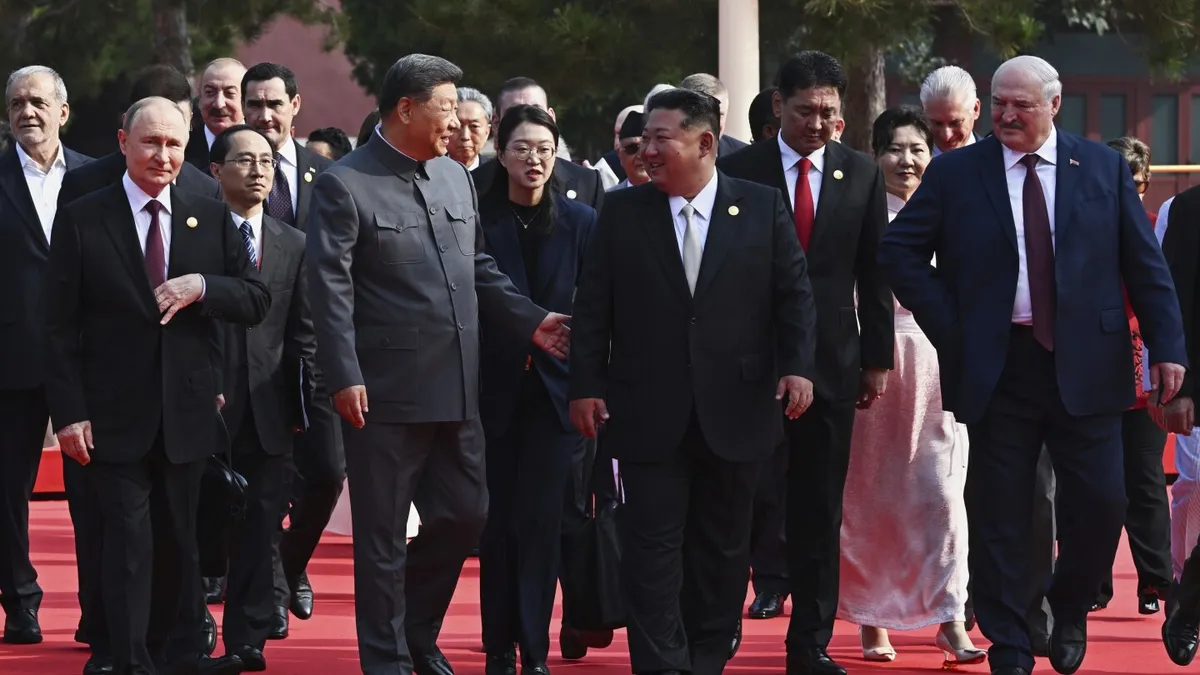
In a significant display of international solidarity, Chinese President Xi Jinping welcomed the leaders of 26 countries and other foreign representatives to commemorate the 80th anniversary of the end of World War II. The ceremony took place on Wednesday in the Chinese capital, featuring a military parade that showcased both military hardware and marching troops, emphasizing Beijing's growing influence on the global stage.
Among the prominent attendees were Russian President Vladimir Putin and North Korean leader Kim Jong Un, who made a rare foreign visit for this occasion. As they ascended to the viewing platform overlooking Tiananmen Square, their presence alongside Xi symbolized a united front against the United States and its allies. In stark contrast, leaders from the U.S., Western Europe, Japan, and India were conspicuously absent, while countries like South Korea and Singapore opted to send lower-level officials.
The joint appearance of these leaders has been interpreted by observers as a direct challenge to the U.S.-led international order. The gathering of nations viewed as U.S. adversaries included Iranian President Masoud Pezeshkian and Belarusian President Alexander Lukashenko, the latter walking alongside Kim after participating in group photographs together with other leaders.
The majority of the national leaders present hailed from Asia, with notable figures such as Indonesian President Prabowo Subianto, who had initially canceled his trip due to domestic protests but ultimately made it to Beijing. Other Southeast Asian leaders included Cambodia’s King Norodom Sihamoni, Vietnamese President Luong Cuong, and Malaysian Prime Minister Anwar Ibrahim. Not to be overlooked, Myanmar’s military leader Senior Gen. Min Aung Hlaing and Lao President Thongloun Sisoulith also participated in the event.
From South Asia, the lineup featured Pakistan’s Prime Minister Shehbaz Sharif, Nepali Prime Minister Khadga Prasad Oli, and Maldives’ President Mohamed Muizzu. Central Asian leaders included Kazakhstan’s President Kassym-Jomart Tokayev, Tajikistan’s President Emomali Rahmon, Kyrgyzstan’s President Sadyr Japarov, Uzbekistan’s President Shavkat Mirziyoyev, and Turkmenistan’s President Serdar Berdimuhamedow. Additionally, Mongolia’s President Khurelsukh Ukhnaa and leaders from Africa, including Zimbabwe’s President Emmerson Mnangagwa and Republic of Congo’s President Denis Sassou Nguesso, were in attendance. The only representative from the Americas was Cuban President Miguel Díaz-Canel.
The guest list shared considerable overlap with the recent annual summit of the Shanghai Cooperation Organization, yet there were notable absences, particularly from India and Turkey. Indian Prime Minister Narendra Modi shared positive reflections on his interactions with Xi and Putin on the social media platform X, highlighting his "fruitful meeting" with Xi and expressing that "conversations with him are always insightful."
Aside from Putin and Lukashenko, attendance from European leaders was minimal. Serbia's President Aleksandar Vucic and Slovakia's Prime Minister Robert Fico were among the few who participated. Former Romanian Prime Ministers Adrian Năstase and Viorica Dăncilă were also present, alongside former leaders from New Zealand, including Helen Clark and John Key, as well as Daniel Andrews, the former premier of Victoria, Australia.
This gathering not only commemorated a significant historical event but also showcased the shifting dynamics in global politics, highlighting Beijing’s intent to strengthen its alliances and influence, especially among nations in the Global South and emerging economies.